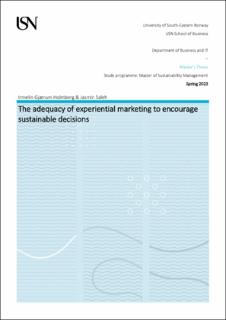| dc.description.abstract | As the topic of sustainability has become an increasingly more important topic, there is still a growing incline in the amount of greenhouse gas emissions being produced. This has caused companies all over the world to turn to sustainable strategies and the production of sustainable products. However, there is still not a significant trend with the consumers to purchase environmentally friendly products. The conventional marketing strategies used by companies selling environmentally friendly products seem to be lacking in results. The aim of this study is therefore, to investigate whether experiential marketing could be a better tool for convincing consumers to purchase more environmentally friendly products and adapt a more sustainable consumer behavior.
The research questions investigate in this thesis is:
RQ1: Can sustainable product claims communicated through experiential marketing methods increase sustainable product purchases compared to traditional methods?
RQ2: To what extent can experiential marketing effectively communicate and enhance the credibility of sustainable product claims?
RQ3: To what extent can experiential marketing emphasize the perceived magnitude of sustainable products' impact?
RQ4: To what extent can experiential marketing effectively represent the underlying environmental issues that must be addressed?
To conduct the research a survey was created to see if experiential marketing vs. conventional marketing led to a higher willingness to choose an environmentally friendly product and a higher willingness to pay a premium for a sustainable product. We then investigated if this came as an effect of perceived magnitude of the problem, perceived personal relevance, perceived efficacy, and perceived credibility of claims. An analysis of the survey results was done by running an analysis of variance through SPSS.
The results show that the participants exposed to experiential marketing exhibited a greater willingness to pay a premium, while there was no significant difference in terms of willingness to choose an environmentally friendly product.
In order to establish if experiential marketing may be a vital component for the impending promotion of sustainable choices, our research tries to clarify the connection between experiential marketing techniques and sustainability.
As a collaboration, experience and sustainability are still evolving. According to the results of our study, sustainable consumption will succeed when it is coordinated. | |
